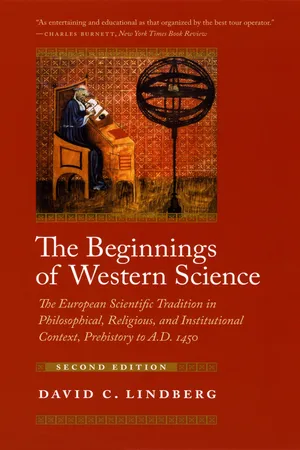
eBook - PDF
The Beginnings of Western Science
The European Scientific Tradition in Philosophical, Religious, and Institutional Context, Prehistory to A.D. 1450, Second Edition
- English
- PDF
- Available on iOS & Android
eBook - PDF
The Beginnings of Western Science
The European Scientific Tradition in Philosophical, Religious, and Institutional Context, Prehistory to A.D. 1450, Second Edition
About this book
The most comprehensive account of ancient and medieval science, a standard work for understanding the history of science
The Beginnings of Western Science is a landmark, the best book to ever to present a unified account of both ancient and medieval science in a single volume. Chronicling the development of scientific ideas, practices, and institutions from pre-Socratic Greek philosophy to late-Medieval scholasticism, David C. Lindberg surveys all the most important themes in the history of science, including developments in cosmology, astronomy, mechanics, optics, alchemy, natural history, and medicine. In addition, he offers an illuminating account of the transmission of Greek science to medieval Islam and subsequently to medieval Europe.
The Beginnings of Western Science is a landmark, the best book to ever to present a unified account of both ancient and medieval science in a single volume. Chronicling the development of scientific ideas, practices, and institutions from pre-Socratic Greek philosophy to late-Medieval scholasticism, David C. Lindberg surveys all the most important themes in the history of science, including developments in cosmology, astronomy, mechanics, optics, alchemy, natural history, and medicine. In addition, he offers an illuminating account of the transmission of Greek science to medieval Islam and subsequently to medieval Europe.
For decades this book has shaped the way students and scholars understand these critically formative periods of scientific development, and it continues to be essential to an understanding of the field. this updated second edition includes revisions on nearly every page, as well as several sections that have been completely rewritten. For example, the section on Islamic science was thoroughly retooled to reveal the magnitude and sophistication of medieval Muslim scientific achievement. And the book now reflects a sharper awareness of the importance of Mesopotamian science for the development of Greek astronomy. In all, the second edition of The Beginnings of Western Science captures the current state of our understanding of more than two millennia of science and promises to continue to inspire both students and general readers.
Frequently asked questions
Yes, you can cancel anytime from the Subscription tab in your account settings on the Perlego website. Your subscription will stay active until the end of your current billing period. Learn how to cancel your subscription.
No, books cannot be downloaded as external files, such as PDFs, for use outside of Perlego. However, you can download books within the Perlego app for offline reading on mobile or tablet. Learn more here.
Perlego offers two plans: Essential and Complete
- Essential is ideal for learners and professionals who enjoy exploring a wide range of subjects. Access the Essential Library with 800,000+ trusted titles and best-sellers across business, personal growth, and the humanities. Includes unlimited reading time and Standard Read Aloud voice.
- Complete: Perfect for advanced learners and researchers needing full, unrestricted access. Unlock 1.4M+ books across hundreds of subjects, including academic and specialized titles. The Complete Plan also includes advanced features like Premium Read Aloud and Research Assistant.
We are an online textbook subscription service, where you can get access to an entire online library for less than the price of a single book per month. With over 1 million books across 1000+ topics, we’ve got you covered! Learn more here.
Look out for the read-aloud symbol on your next book to see if you can listen to it. The read-aloud tool reads text aloud for you, highlighting the text as it is being read. You can pause it, speed it up and slow it down. Learn more here.
Yes! You can use the Perlego app on both iOS or Android devices to read anytime, anywhere — even offline. Perfect for commutes or when you’re on the go.
Please note we cannot support devices running on iOS 13 and Android 7 or earlier. Learn more about using the app.
Please note we cannot support devices running on iOS 13 and Android 7 or earlier. Learn more about using the app.
Yes, you can access The Beginnings of Western Science by David C. Lindberg in PDF and/or ePUB format, as well as other popular books in Biological Sciences & Ancient History. We have over one million books available in our catalogue for you to explore.
Information
Fig.
1.1.
A
Babylonian
clay
tablet
(ca.
1900–1600
b.c.),
containing
a
mathematical
problem
text
dealing
with
bricks,
their
volumes,
and
their
coverage.
Yale
Babylo-
nian
Collection,
YBC
4607.
e
text
is
translated
and
discussed
in
O.
Neugebauer
and
A.
Sachs,
eds.,
Math-
ematical
Cuneiform
Texts
,
pp.
91–97.
60
3
60
2
60
1
Mo
d
ern
Hin
d
u-Arabic
Equivalent
32
1
3600
12
60
23
4,343
2
1/60
12
1/3600
1/30
1/300
11/300
1
10
2
216000
22
3600
511,200
2
60
16
136
(1)
(3)
(5)
(4)
(2)
1
/
60
1
/
60
2
Table
1.1.
Five
Babylonian
Sexagesimal
Numbers
and
eir
Hindu-Arabic
equivalents.
Table of contents
- Contents
- List of Illustrations
- Preface
- 1 Science Before the Greeks
- 2 The Greeks and the Cosmos
- 3 Aristotle’s Philosophy of Nature
- 4 Hellenistic Natural Philosophy
- 5 The Mathematical Sciences in Antiquity
- 6 Greek and Roman Medicine
- 7 Roman and Early Medieval Science
- 8 Islamic Science
- 9 The Revival of Learning in the West
- 10 The Recovery and Assimilation of Greekand Islamic Science
- 11 The Medieval Cosmos
- 12 The Physics of the Sublunar Region
- 13 Medieval Medicine and Natural History
- 14 The Legacy of Ancient and Medieval Science
- Notes
- Bibliography
- Index